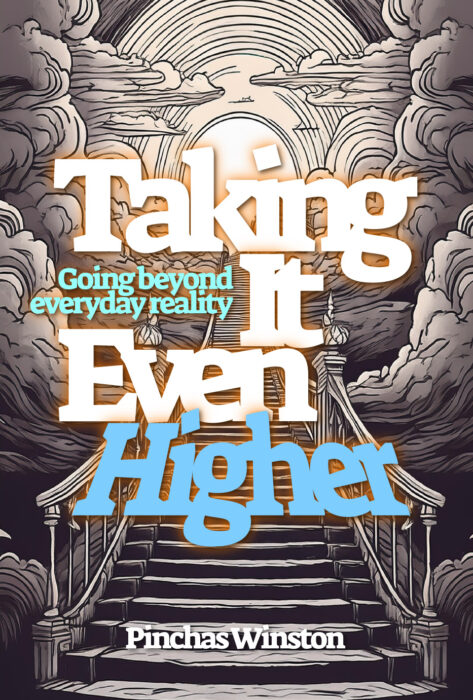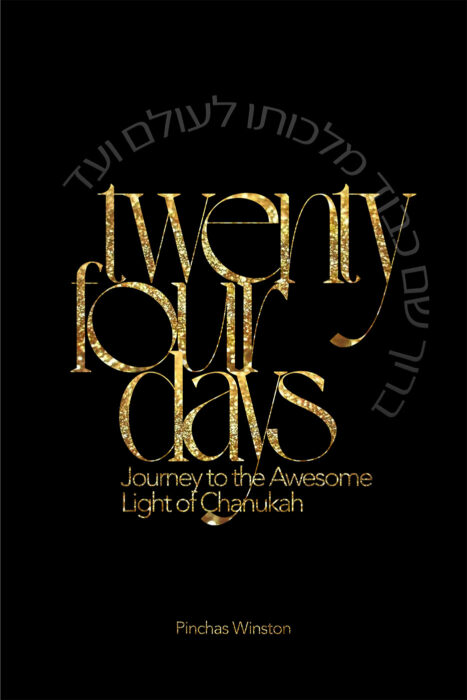Parashas Vayishlach, Issue #872 / CTD #9 – By Pinchas Winston
Ya’akov was frightened and distressed. He divided the people who were with him, the flocks, the herds and the camels, into two camps. (Bereishis 32:8)
WHEN YA’AKOV AVINU heard that Eisav was coming out to “greet” him with 400 men, who were probably just as fierce as Eisav, he became afraid. Who wouldn’t have been afraid? He was coming up against a brute of a person and his vicious army, and even if Ya’akov could take care of himself, he had to also take care of his young family and all his possessions, which made him far more vulnerable. So again who wouldn’t have been afraid?
But this was Ya’akov Avinu, “Man of Truth.” This was a man who all of his working years had to survive against the odds, and who witnessed first-hand how miraculously God can save a person. As Lavan just finished telling Ya’akov at the end of last week’s parsha, he had the ability to harm Ya’akov, and would have, if God had not warned him to leave Ya’akov alone. A lesser man might have feared Eisav, but Ya’akov Avinu?
After all, we were also just told that once Yosef was born, Ya’akov was not afraid to return home and confront Eisav. Compared to the “flame” of Yosef, Eisav was considered to be like straw. With his army of 400 Eisav-like people, they were just a LOT of straw. So, what was he worried about?
The commentators ask this question, because such fear seems to have been below Ya’akov’s level of bitachon and emunah—trust and faith in God. When it comes to the Avos and the Shevatim, though it may LOOK like something we would say, do, think, or feel, it is usually not, and it requires some kind of spin to make it sound right.
So, for example, it is explained that Ya’akov Avinu did not fear Eisav per se. Rather, he feared that his inability to honor his father and mother for 22 years, while Eisav did, left him spiritually vulnerable, and therefore physically vulnerable. He might escape Eisav, but would all those whom he loved and protected escape too? OUR spiritual mistakes can leave OTHERS vulnerable.
True, God had protected him until that point, but Divine protection is not an open check. It COSTS. The problem is, who knows how much and for what? The Talmud says that God has much greater expectations of righteous people than average people, so the slightest slip up for them can be equal to huge mistake for an average person.
The upshot is that no one really knows where they stand with God, or what they have coming to them. An average person knows that he has more than enough red marks by his name to justify being left high-and-dry when in a bind. A righteous person may know that he serves God well, but that only means that his smallest of “sins” may also cause him to be left in a bind, as Ya’akov found himself the day he confronted Eisav on his way home.
So, can Ya’akov be faulted for being afraid of Eisav if it was a result of his own humility? If, in one’s own humility, a person deems himself unworthy of a miracle when he needs one, even if through no fault of his own, can he be blamed? If anything, it is such humility that should make a person worthy of a miraculous redemption!
Not really, explains the Leshem. Quoting the Midrash Tehillim, the Leshem explains that bitachon—trust in God—is a trait unto itself. “Trust in God whether you’re a good person or an evil one,” the Midrash says, and the Ramban reiterates. Trust in God won’t erase sins of the past, but it will push them aside momentarily in a time of need and bring success.
As the Ramban explains, once the miracle is over, a person has to still make a point of doing teshuvah for past transgressions. Otherwise, after a person’s bitachon saves them from trouble, their unrectified sins can put them right back into it again.
Therefore, Ya’akov Avinu really had nothing to worry about as long as he trusted in God. It’s not a question of humility. It’s a question of trust, and the more complete the trust is, the more of a miracle a person will see. As the Leshem puts it, “Nothing stands in the way of bitachon.”
NOTHING.
This makes bitachon one of the most important traits to develop. Like a muscle, it is there, but if left undeveloped, it will be weak when called upon to lift a “load.” Bitachon has to be constantly exercised, on all levels of living. We just don’t realize it because God allows us to enjoy all kinds of miracles on a daily basis without us even thinking about them, like your heart beating regularly, or you digestive system doing its job from hour to hour to keep you alive and feeling good.
Considering the importance of bitachon, it is surprising that it is not taught and developed in cheder, and yeshivos. It is ridiculous that more classes are not on the topic, or that rabbis don’t address the issue from the pulpit on a regular basis, even if only for 10 minutes at a time. It’s a mentality, and if forgotten about, we won’t have it when we need it the most.
As a nation that has known no end to anti-Semitism and national crisis, we should know better. And yet . . .
CONNECTING THE DOTS – Issue #9: Viral Message
IT STARTED WITH a phone called from Eliyahu Berkowitz of Israel Breaking News. He usually calls me when something happens that might be geulah-related, to get my take on it. The recent surprise war in Gaza prompted this phone call.
The basic question was, “Can we know what events will lead to the War of Gog and Magog?” The basic answer was, “No.” I explained to him that the War of Gog and Magog is a variable, meaning that its final form can change based upon where the Jewish people are holding at the time.
Each War of Gog and Magog—there are supposed to be three—is not ONLY a war. Each one is meant to accomplish something very specific for the sake of redemption, and their size and impact depends upon what is left to do. If the Jewish people take care of the lion’s share of redemption preparation, then the final War of Gog and Magog will be kitty size. If we only prepare a cat’s worth, then it will be lion-size.
Not knowing what is left to be done in preparation for the Final Redemption, we can’t know precisely what will lead to it, vis-a-vis the War of Gog and Magog. Therefore, I told Eliyahu, EVERYTHING can potentially be a lead-in to what can end up being the war to end all wars, especially if it begins unexpectedly.
Why unexpectedly? Because, as I have explained many times in the past, Dovid HaMelech gave us a hint how to read history when prophets are no more, and Ruach HaKodesh is, at best, questionable. He wrote: “This is from God, that which is WONDROUS in our eyes” (Tehillim 118:23), meaning, we didn’t see it coming, and don’t know why it did.
In other words, when an event occurs that seems to be, from our perspective, “out of the norm.” It can be a negative OR positive event, but if it makes us stand back and say, “Well, that’s really interesting . . .” especially if it directly impacts the future of the Jewish people, then it is OVERT Divine Providence, and therefore, perhaps, a geulah-motivated event.
There are many examples of this, one of which is the events that led up to the holiday Chanukah, or more recently, both world wars, but that’s a discussion for another time. But the point is the point, and that is why the current Gaza conflict is suspect.
Suspect. Potentially. That’s all. I am well aware of the dangers of making predictions having to do with the End-of-Days. I know the danger of telling people something SPECIFIC will happen by a certain date, and it doesn’t. I’ve learned the curse of the Talmud for people who predict Moshiach’s arrival because of the despair this can cause when it does not come to fruition. I couldn’t predict such a date even if I wanted to.
My message is controversial, so I am VERY careful how I say it. There are many things that have been discussed by me which I have not allowed to make it to print. I know how people react to such information. I was reminded of this again just last week.
But alas, we’re living in an age of sensationalistic journalism and what has come to be called “false news.” So, the Alex Jones Report picked it up, and they added a great sense of urgency to the message, quoting me as saying that the war in Gaza WILL lead to the biblical War of Gog and Magog.
The Drudge Report, also a right-wing media source, picked it up from the Alex Jones Report, and just like that, a couple million more people potentially were exposed to the War of Gog and Magog beginning in Gaza last week. One person, probably seeing one of these two “news sources,” wrote me personally, angry that I spoke about such a conflict, even calling it disgraceful.
In the meantime, a British tabloid also picked the story up, and with an interesting twist, promoted me to former chief rabbi of the IDF. But, someone wrote them from Honest Reporting and corrected the error, before I even had a chance to collect any army pension. Oh well.
As I pondered, the rest of the week, what had happened, I considered the Divine Providence of it all. The most obvious message was one I had used just the previous week, that in this day of social media, you have to be wary of how what you say will be used and where. But, when I recalled what I had done, I concluded that I HAD been careful of my words, HAD been concerned about the greater impact, and would NOT have done anything differently.
It was just weird, and somewhat amusing, for both Eliyahu and me, how THIS particular message THIS time got so much attention. The more I thought about it, the more I considered the chain of events, the more it felt as if God had been the One to make a point of making this local message more international.
It reminded me of Y2K. Y2K? What’s that?
Well, 18 years ago the world held its breath as 1999 rolled into 2000, because many had predicted the older computers would not be able to make the transition without a major crash, leaving the world somewhat vulnerable.
The potential threat had been stewing for years, and as 1999 came to a close, the concern translated into articles, first in more extreme media sources, and then eventually in mainstream ones. All of sudden, The New York Times mentioned things like “Torah,” and “Bible,” “Armageddon,” and “Messiah,” and, if I read correctly, even “Moshiach.”
In the end, Y2K proved to be a dud, a false alarm, because the world spent 64 billion dollars to fix the problem before it occurred. There was an international sigh of relief as the world moved on, like a child who has passed his test and was promoted to the next level.
It was only THEN that I realized that Y2K, especially with its Kabbalistic implications and allusions, had done its job, just not the one that people thought it had come for. People had thought they had left EVERY aspect of the crisis in the rearview mirror. In the end, it was probably the greatest non-event in history to have had such a dramatic and lasting impact on the psyche and intellectual vocabulary of mankind. It had changed the world, and almost no one knew.
That’s the way life works in general. Everything affects us. Everything impacts our lives. The more dramatic it is, the more this is so. The more something catches our attention, the more it will knock us along our way. The more it emotionally upends us, the more it will redirect us. Sometimes we can recover. Most of the time we don’t.
Take 9/11, for example. Anyone who was old enough to know what happened that day was changed—FOREVER. How could you not be? It so changed so many Americans that when the President signed into action new measures right after the attack, no one even considered how just before the attack they would have argued against them.
On 8/11, the new laws Congress enacted would have been considered an infringement of personal rights, certainly by more liberal think tanks. On 12/11, they were considered crucial for the protection of those rights by the entire nation, who didn’t even have the strength of will to question how such an attack could take place on American soil in the first place, or cause destruction on a scale that could not be explained by the government’s explanations.
One thing was certain: the world had changed once again, and dramatically. It didn’t matter that America picked itself up again a year later and went back to work. The fact that you forget you turned a corner 15 minutes ago does not negate the fact that you did. The national consciousness had been forced to look at life differently, and it could never go back to the way it was. God made sure of that.
And then came the Housing Crash of 2008. As predictable as it was because of all the sloppy lending and borrowing, it still came as a surprise. Humans are capable of throwing caution to the wind, and confusing hope for statistical fact. I was on a plane back from Manchester to Israel when I saw the big, black, bold headlines announcing what had happened.
Then came Barak Hussein Obama, an upbeat entertainer with a penchant for turning a good phrase. It wasn’t necessarily what the world needed, but it was what the world wanted, especially when the Republicans just could not find someone who could win the confidence of a depressed nation.
All of a sudden the liberals, for the first time in a long time, if not the entire history of the American people, found themselves in the candy story with the key. The first thing they did was lock the door behind them, so that the Republicans could not sneak anyone back inside and thwart the liberal agenda. And again, America changed. And again, much of the world changed with it.
That’s why the election of Donald Trump came as such an abrupt slap across the face for so many worldwide, not just the Democrats and many anti-Trump Republicans. Trump, for all of his negative mannerisms and attitudes, had put the brakes on the slide towards a more liberal world. For many, it was as if they had suddenly and inexplicably been thrown forward into an expanding airbag. OUCH!
I could go on and on about this point, in both directions, the past and the future. I can’t predict what will happen, but I can predict that something WILL happen, because of where we have to end up in the end, and where we, as a people, are now holding. In my corner are the prophecies and past history. Working against me are all the unknowns that have always made Jewish history so mysterious and, tragically, so dangerous. The Holocaust was a “miracle” too.
So, as I considered what happened in Pittsburg just weeks ago, and the prevalent messages that emerged from it, Divine Providence-wise, I have to wonder about the Hashgochah Pratis about what happened with my article last week. It’s a message I’ve been telling for years. My “friends” have not called me the “Doomsday Rebi” without reason. It just got amplified by Divine Providence.
As always, it all comes down to what you believe. And, as I told my neighbor last week, after already speaking to his son-in-law, there are people who have never stopped to ask me anything about what I teach.Everything I say or write has a good source, even a GREAT source lots of times. I don’t just spew personal opinions. I have spent years building my “presentation.”
So far, no one who has ever argued against me has shown me why those sources are unreliable, not worthy of our attention. They usually just argue, or quote old sources and attitudes that really don’t apply anymore. They don’t like the message. It doesn’t sit right with them. So, rather than sit down with me to discuss how I arrived at my conclusions, they vent their anger at me, as if intimidation invalidates my message.
I DO get intimidated, but not because I doubt what I have seen. On the contrary, I believe that if such people were honest enough to look at what I have learned, they would come to the same conclusions. It’s just that I HATE controversy, REALLY hate it. I don’t mind positive attention, but negative attention, well, that tends to sting, right or wrong.
But the message is the message, and when it is not adulterated by sloppy reporting, it is one that I stand by 100 percent. And, if God decided to take it to the masses (He obviously doesn’t need my copyright permission), in whatever form it gets there, then you must wonder, what’s He trying to tell us?
Pinchas Winston
Thirtysix.org



















